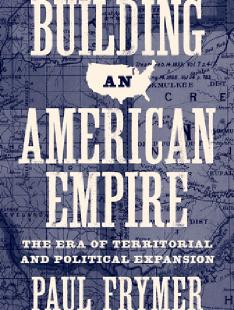
The book: The narrative surrounding America’s westward expansion has become inextricable from the way we think of the American Dream: full of rugged individualism and pluck. Left out of this story, however, is the outsized role the federal government played the establishment of the 48 contiguous states. In Building an American Empire: The Era of Territorial and Political Expansion (Princeton University Press), professor Paul Frymer discusses the politics of American expansion, and how the government’s regulation of population movements on the frontier advanced national aspirations for an empire and promoted a white settler nation.
Frymer explores the United States government’s attempts to exercise unlimited power over the expansion, even using federal land policy as a way to influence and direct the unfolding of the country’s westward expansion. Using such tactics as mobilizing populations for compact settlement in strategically important areas of the frontier and enforcing policies designed to restrain settler populations to circumvent violence, international conflict, and breakaway states. These efforts were not always so successful, and Frymer delves into the failures, including the lack of further expansion into Latin America and the defeat of the black colonization movement.
The author: Paul Frymer is professor of politics and director of the Program in Law and Public Affairs at Princeton University. He is the author of multiple books, including Uneasy Alliances: Race and Party Competition in America (Princeton University Press).
Opening lines: “Empire consumed Americans in the nation’s earliest years, as an idea, an aspiration, and a reality. The colonists declared their independence from Britain, were surrounded by France and Spain, and frequently spoke of the glory of Rome, as they looked north, south, and west at vast expanses of land. Although the word “empire” meant different things to different people, it was used widely and ambitiously. George Washington predicted ‘there will assuredly come a day, when the country will have some weight in the scale of Empires,’ while Alexander Hamilton wrote in the first of the Federalist Papers of ‘the fate of an empire, in many respects, the most interesting in the world.’ Some, like Thomas Jefferson, thought the United States would quickly expand over the northern and southern hemisphere, providing ‘an empire of liberty’ of which ‘no constitution was ever before so well calculated as ours for extensive empire and self government.’ ”
Reviews: Bancroft Prize-winning author Edward L. Ayers says, “Ranging across a wide array of topics and scholarship, this book remaps large parts of American history. In Frymer's telling, the nation's territorial expansion emerges as a far more fascinating and perilous journey than we had imagined.”

